Design Alex Bosserman / Photo Edit Julianna Bosserman
By Alex Bosserman
June 13, 2023
As the world finally emerged from the dark pandemic cloud, so too had the artists we’d waited on. Despite the mailase and insecurity that’s gripped us, these artists, long in their careers and amidst their prime, have released some of their most deeply creative albums. What they all share is a formidable confidence and vision which cements Beyonces right to declare 2022 as an official Renaissance moment for all.
Listen to the strongest tracks from my list below.
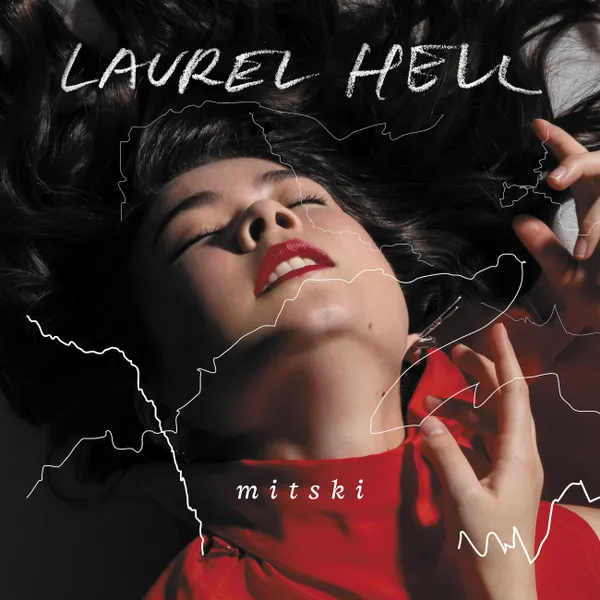
Mitski. No longer a nobody. An emotional supermassive black hole of a lyricist, with a yearning voice that is overwhelmingly relatable and insightful. The Tik-Tokification of Mitski should have come to no surprise – this generation of doom scrolling nihilists understands exactly what Mitski is talking about, and like the addictive nature of the internet’s algorithms, they simply can’t get enough of her understanding.
That isn’t to say that Mitski isn’t a positive person – “Strawberry Blonde” sounds like joy personified, ukulele strumming, frolicking through the fields lover in tow. Wait. What’s that? Oh, the lover is a mirage, unrequited and unreciprocated. That’s the indie angst and emotional realist intrinsic to her poetry, coming to fruition in different genres throughout her discography. Garage rock anthems, sultry jazz singles, somber ballads and in recent albums, shoegaze electro-rock.
Laurel Hell did not surrender to the desire of mainstream appeal, given Mitski’s newfound audience. In fact, it did the opposite of “Be The Cowboy,” by being excessively safe. This is Mitski’s weakest work yet, but shitty pizza is still pizza. Where “Washing Machine” heart succeeded in its unusual structure and approach to a popified Mitski, “Love Me More” is the most conventional 80’s adrenaline rush vis-à-vis Kate Bush. Fun, but not exactly novel.
“The Only Heartbreaker” is a more successful stab at disco-rock edge, Mitski emotionally churning and immolating into an erratic explosion of guitar chords that spread her atoms across the universe (in the music video). Exhilarating!
But also devastating – “Working For The Knife” acknowledges the state of her career, the emotional excavation required to lay it all on the line for ravenous fans that see her as a personal Jesus, the only one who understands their salvation and sins. How could she ever live up to the image she’s built for herself and trudge forward? In the same way she produced an album like this after rocketing into fame – encapsulating it all in song as means of therapy, self soothing after exhausting all energy.
“That’s Our Lamp” is so lyrically simple and modest it could’ve been plucked as a deep-cut from her first album. Listen closely though and you’ll hear a sampling of noisy chatter, audio tension best described as voices in your head, a cacophony of unresolved issues, desires, traumas, a one woman band marching into the sunset hysterically reminiscing on when times were good, before it all got complicated.
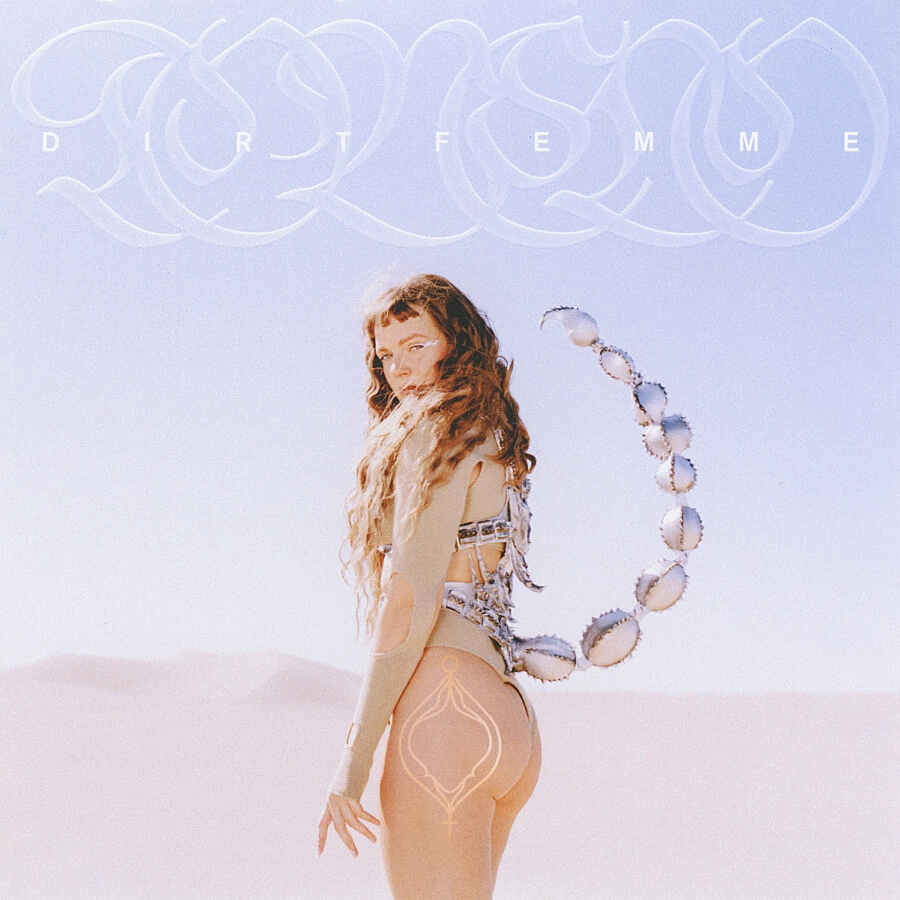
Tove Lo has occupied a unique space in the world of pop. Unabashed sexuality is her impulse – flashing live audiences in concert, getting head from a Muppet in music videos, two albums named after genitalia. She was and remains the cool girl, but the cool girl went and got married.
This newest album is a strange but enticing mix of sensuality on the dance floor and intimate retrospection in the sheets. Where Sunshine Kitty was a tropical vacation and Blue Lips an electric night out, Dirt Femme is a domestic retro-futuristic contention of Tove’s new married life as a “pansexual woman married to a straight man.” This is without a doubt Tove’s strangest emotional point, as the album morphs from brutal ballads about paying the ultimate price to sexually thirsty electro-pop bangers.
In the music video for “No One Dies From Love,” Tove cycles through countless sex robots, trying them on and moving to the next. It feels as though she’s mourning her freedom, especially given the follow-up track “Suburbia,” which, alongside its literal title, has Tove telling her man “I can’t be no Stepford wife.”
All becomes clear once “True Romance,” the 4th track, comes to its climax. Tove has never been acclaimed for her vocal ability, but here it is on full display in a moment that is rare in pop music. Her voice strains and shoots to its ceiling, “In danger of a true romance.” To Tove, sex is no longer a game to be played with strangers but something you fear losing once committed.
But that doesn’t mean it isn’t any less sticky – take “Pineapple Slice,” Tove’s most gushy song yet, lyrics of tastes and textures, hips and lips you can move to alongside the bouncy groove. And that doesn’t mean there isn’t tension or flirting anymore, either – “Attention Whore” is further evidence of Tove’s wandering eyes chasing what-ifs, a revolving dance track that simplifies to an addictive chorus that is too playful and tongue-in-cheek to resist.
Closing track “How Long” is the most captivating, with a cycling synth line that is submerged under a low-pass and released in shimmering melody during the chorus. Each section of the song is nocturnal, slowly building as Tove insecurely questions romance. Sonically, it is an interrogation of Tove’s own security, in or out of love, but in her music, surely at her prime.

Nobody has steered the trajectory of their music career quite like Charli XCX. In 2014, “I’m so fancy!” was on the lips of the public, its signature chorus begging for a platform like TikTok to feed off of, and before that, “I don’t care!” echoed across the planet, landing Charli in the hot seat of her own solo career. Pop stars whose fame launched from Charli’s earworm writing careened off the bridge and into the water (Iggy *cough* Azealia), their residual electricity shocking the copilot into realization – I’ll just drive the damn thing myself.
What resulted was a 5 year stint in futura bold and abrasive pop music that was slick, shiny, aggressively cool, never been done before, what’s that Lady Gaga meme again? It was a new genre of pop which became a monstrous achievement, one that any other artist would have succumbed to with pride. She nearly did, zealously self-titling her next project, but “how i’m feeling now” was a quarantined extrovert’s emotionally charged Zoom rave that revealed her secret to growth and antidote to creative death – a pinch of insecurity.
In the music video for “Good Ones,” a hypnotically mesmerizing loop of a song, she literally crawls out of the grave, and on the album cover, she’s expectantly peering down at you atop your car hood, drenched in blood. Ambitious to please her squealing fans and fulfill the contractual obligation of her chart-chasing label, the combination is used as nitrous, Charli speeding in reverse to pick up references from past and bring them into the future.
“Lightning” summons orchestra-hits from the 80s and pairs it with vocoders, spanish guitars, and lithe groove. Sounds like these seldom come together but make perfect sense, just like the meeting of Christine and The Queens and Caroline Polachek on the soaring chorus of “New Shapes.”
“Beg For You” initially disappoints in that it directly rips September’s “Cry For You,” but in context, mirrors the intent to whip the best parts of pop music into a frenzy that excites itself to dance. “Used To Know Me” is the best example, a prideful house anthem that is about as basic as any number from “Chromatica,” but just as essential to a good time in this arena of pop.
Crash is current in the concept of present-nostalgia, that is, it lifts the aesthetics and sounds of the 80s like every other act of the day – think Dua Lipa’s “Future Nostalgia,” The Weeknd’s latest work, or The 1975’s entire discography. The difference with Charli’s concoction? It’s all mixed with her existing ideas, sounds that push the envelope complimenting ones that are tried and true. And at this point, we know Charli’s recipe will always work.
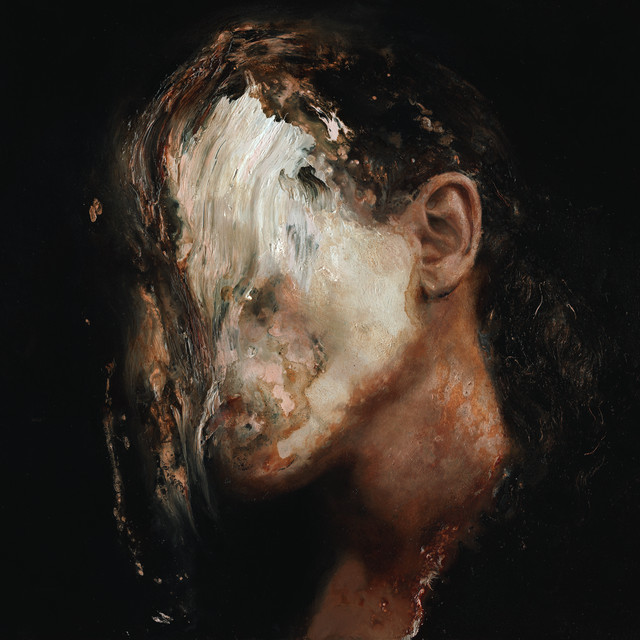
070 Shake is now two-for-two on album covers, both pastiches of her own work, both orienting listeners in the direction of its music. Where her debut album was a flight through the stratosphere, sonically in instrumentation but literally in her ascension to success, this album is a mixed palette of sounds that are notably confident and established for someone so early in their career.
Modus Vivendi relied quite heavily on its sci-fi themes, and to no complaint by me – it was the best album of 2020. But it’s good Shake didn’t get laser focused on how well her androgynous inflection and holistic perspective aligned with that aesthetic. You Can’t Kill Me centers what is unique about Shake beyond her voice – her control and ability to wrangle up energy, pushing it to a place some call spiritual.
“Vibrations” is evidence of that perspective, it’s first half ambient and meditative with samples of laughs and gasps for air, before we hear Shake, “I can see you.” Then the synth line comes in, “That’s why I never say shit to you, I’m feelin’ the vibration,” and we’re off to the cosmos, waves of electronics, crescendoing blips, a crooning yet angelic voice finishes it, “We will fly.” Like the rest of her work, it feels like fateful, cinematic design.
Unconventional song structures are the gig here, third track “History” beginning with an organ and vocoded Shake, “We’ll go down in history.” Then, a sinister synth line and trap beat takeover for what feels like an epic showdown piece, where Shake contends with her love, the third act once again switching the beat, violins sucking the air out into a distorted saunter through volumetrics.
“Cocoon” is another standout, a song about painfully outgrowing a lover, whose lyrical climax is relinquished alongside a massive bass drop followed by hyped ad-libs. This control over power, the ability to know when it’s time to move on, and also when it’s time to move in, is what seduces and kills. Intro track “Web” exemplifies that temperament, one which discerns power and exerts it accordingly, “What kind of person would I be, if I let you drive hours here for me?”
Proclaiming immortality would be grandious for anyone else, but for Shake, it is a recognition of the power all of us hold to effect others beyond this life. At the top of her game, she’s a world apart from her contemporaries in hip-hop, retaining all the confidence while leaving behind bravado in favor of tenderness.

Salty ocean breeze curling hair, legs swaying in introspection, SZA perched atop a diving board against an ocean ready to swallow her endless musings – “And if you wondered if I hate you, I do,” this is SZA at her saltiest but sweetest, headiest but physical, depth in exploration of genre and cavernous anxieties. “SOS” is a long album, the amalgamation of years of emotional labor putting together what she was calling her last work.
“SOS ” feels a step further than “CTRL,” an album which already spotlighted what the R&B genre was capable of. Now, SZA’s voice has settled into a tone more smooth, less sharp, producers admittedly experimenting with sound more, describing the creative process as “throwing paint at the wall,” and SZA’s pen game as “a rapper tied up in a vocalist.” Tracks shift from punk-rock bangers to lowkey indie, gospel to surf rock, and melodic rap to trap. The result is a monstrous 23 track length, a reflection of the album’s creative process, but also the depth of what SZA has to say.
One track she’s the bad bitch playing games and winning, “Notice Me,” an aquatic bouncy beat cushioning SZA’s teasing, “I don’t wanna be your girlfriend, I’m just tryna be your person,” the next track in full breakdown. “Special” is the piece of shit boyfriend anthem, something that initially makes you ask, “What does she have to be so insecure about?” but makes sense given every other song is about dating trash.
“Blind” is a full admission of bad habits, ignoring red flags and “all of the love I see, living inside of me,” cognizant of what could be but being too insecure to grasp it personally. In “Ghost in the Machine,” queen of sad girls Phoebe Bridgers mirrors SZA’s turmoil in tone and lyricism – “You said all my friends are on my payroll, you’re not wrong, you’re an asshole.”
But that self pity morphs into the most toxic headbanger we never expected on “F2F.” As the guitars teleport us back to angsty adolescence, SZA vents and belts in the center of it, “I fuck him cause I miss you!” It’s all so convincing because this is a rollercoaster most have willingly ridden, from butterflies and teasing, to unhealthy obsessions and games navigated, eventual heartbreak and the residual bitterness. It’s just that SZA should have closed it with heartwarming acousitc influenced “Open Arms,” a cute farewell, “I guess I gotta go.”

Disclaimer: This was written long before recent news dropped revealing just how low Matty Healy can stoop in his actions, words, and personal views. I acknowledge it’s unfair to leave such a positive review up, especially in comparison to the Beyonce dragging below, but I’ve done enough editing and so this should suffice.
Let’s all agree – Matty Healy is a piece of shit, and when he drops the profoundly woke, cigarette dragging, philosophizing and disaffected rock frontman schtick, we’re left with fantastic music. This is their most earnest and simple album yet, cutting away the fat and honing in on what makes The 1975, The 1975.
They’d failed to grow beyond alternative indie rock until their prior two albums, wherein the seeds were planted – giant choruses in 80s inspired anthems that tickle your brain just right. “Notes On A Conditional Form” was scatterbrained, Matty’s runaway train of thinking delving into genres far and wide – garage, house, indie, folk. It was, as the title suggests, a collection of notes which required many conditions to understand, especially given its immense runtime. The cutting room floor was bare.
“Being Funny In A Foreign Language” has realized that fault and corrected it in the opposite direction. Jack Antonoff, a producer famous for propping up some of the strongest pop records of the past decade, “Melodrama,” “Masseduction,” “Norman Fucking Rockwell!” is likely to thank. With a succinct tracklist of 11, The 1975 has no time to waste.
“Happiness” opens in glistening joy, unafraid to embrace its namesake. This is a dance track you hear when the guy wins the girl, the sun sets into the horizon, the saxophone enters, and the ring fits the finger. Immediately after “Looking For Somebody (To Love)” bangs around in harmonic chant and clashing guitar, Healy singing about “A boy with a plan and a gun in his hand.”
This is “Pumped Up Kicks” but a decade later, taking advantage of pop’s platform to say something important despite the positive veneer. And while Healy has past admitted “Sincerity Is Scary,” he realizes now, like we all hope the boy will come to understand, that it’s the only path forward.
Frustrating then that “Part of The Band” is unashamed to entirely lift Bon Iver’s sound with its sliding strings and vocal intonation. The 1975’s habit of reference is OK when it reinvents, but here, it flies too close to the sun. Speaking of the sun, why does the instrumental closer on “I’m In Love With You,” a track written to embrace the most pure and earnest statement, literally sound like the warm, loving, radiant rays of it?
“Oh Caroline” has a similar effect. As the chorus soars, Healy belts about doing what the heart wants even when you’re scared of “getting cucked.” This vocabularic wink and nudge alone draws the circle around what makes The 1975 uniquely placed in popular music, but if you’re not interested in all that pretentious shit, just listen to the album closer “When We Are Together.” It’s a dose of the sentiment that when embraced, will place The 1975’s name above a plaque that reads “Best Living Band.”
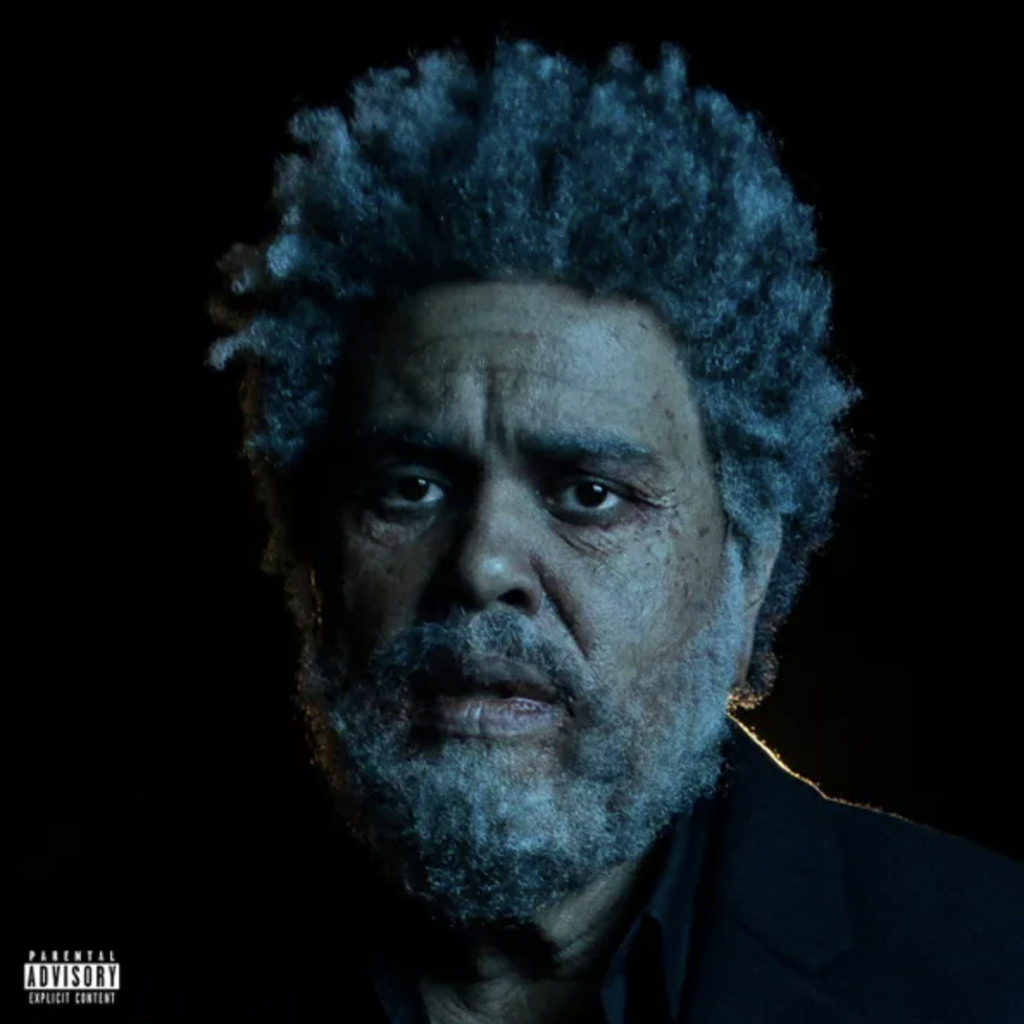
If everything preceding The Weeknd’s latest album was a litmus test for his eligibility to heaven, he’d have been denied entry at the door. Straight to hell where he’d probably rejoice in neverending benders – psychosis via girls, drugs and money, a starboy burning up in the depths of his choices. Now, Abel Tesfaye abandons any taste he had for salvation or change, accepting the common trajectory of all terrestrials towards one thing and one thing only – total annihilation.
It sounds campy because it is – this is the extreme of what Tesafaye had been building towards. It started with stark and braggadocious R&B, matured to maximalist hip-hop fame, singing of cocaine while winning kids choice awards, and most recently, materialized into retro-funk, claiming his throne as the King of Pop, like a modern day Michael Jackson. And while “After Hours” only dipped into that comparison, it was the penultimate step in a plan to build the eras of each album atop each other, planting seeds since “Can’t Feel My Face,” and “I Feel It Coming,” to prepare for a cinematic climax.
At the superbowl, Tesafaye stumbled through a violent haze of his own image, as if careening towards disaster, except now he’s reached it post-peak. Dawn FM is in part a concept album, one he describes as “listening to an adult contemporary radio station as you sit in the tunnel, only the tunnel is purgatory and the light and the end is death.” Threaded throughout the album are radio host bits from none other than Jim Carrey, who soothes the listener into a euphoric comatose on the dancefloor.
In the intro, Carrey asks you “accept your fate with open arms, to free yourself and enjoy.” In the background, the sounds of the album are booting up, glass UI clicks next to shimmering digital positivity, a story about to be told through simulation of sound. From start to end, Dawn FM is an experience where each track bleeds into the next, a radio dial cycling through stations.
“Gasoline” sets the tone, a strobing synth and a punchy kick drum the architecture Tesafaye now navigates in a thick brit-rock accent, “It’s 5a.m. I’m nihilist, I know there’s nothing after this.” The kick drum falls away to an anthemic flurry of synths, straight Swedish House Mafia euphoria on “How Do I Make You Love Me?”
“Take My Breath” is a tunneling journey of desperation, Tesafaye gasping for air over a guitar line saturated in heat, soundwaves trembling against a setting sun as we speed down the highway. “Sacrifice” shares the same addictive bass element from “Gasoline,” before the next two tracks tone things down into a sultry sway, mixes of funk and R&B that are a cool moment of respite from the lyrical onslaught of impending doom.
“Every Angel is Terrifying” is entropy in sound, the synthwaviest moment on the album which morphs into a campy and humorous radio commercial about the afterlife, which sounds like pure bliss, as “Less Than Zero” is a true finale. The electric from the guitar is stripped away into an acoustic jaunt, “I try to fight it but I’d rather be free,” each chorus a dose of morphine carefully formulated by the actual god of pop music, Max Martin.
In the end, Jim Carrey speaks in prose, perhaps one of the most on point castings ever, right up there with Morgan Freeman as Jesus. He meanders through a poem of scriptures, stating that “You gotta be heaven to see heaven,” a wonderful thought to have before turning to the light and slipping away.
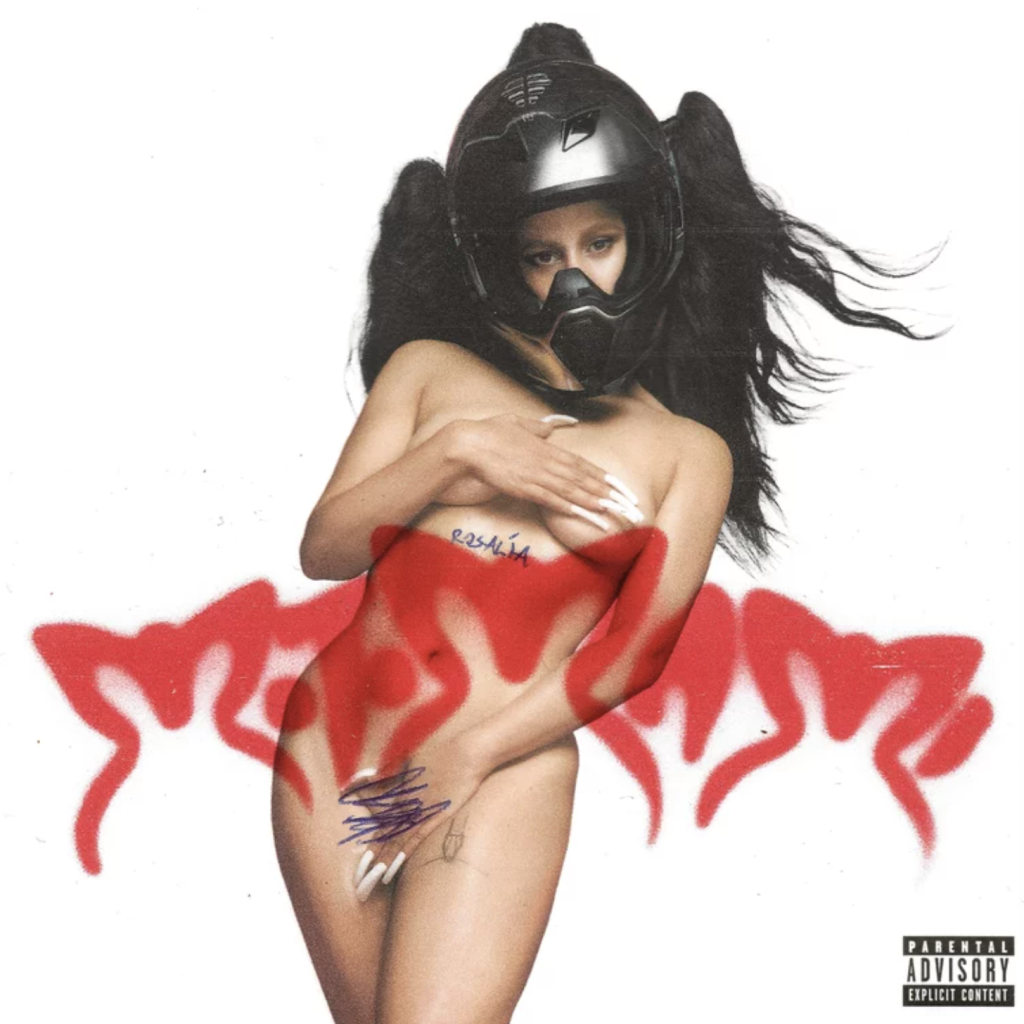
It was only a matter of time until Rosalia’s skill in tradition brushed against her powerful presence in the moment. The combination is a delicate sew to stitch, fashions of yesteryear and memes of today hardly mix in complementary ways. Maybe that special mix of her artistry is positively lost in translation. Dammit I hardly know what she’s talking about but she’s got it… the X-factor.
Proof is nowhere more obvious than on her recent 2023 Coachella stage performance which mirrored her tour act. In it, she confidently postures on stage, present physically, vocally, choreographically(?) and with attitude – her memed to death gum chewing mystifying the Tik-Tok generation with nothing more than a look. But Rosalia is not a meme factory and she can’t be sold out even when she’s selling out internationally.
Rosalia’s prior effort “El Mal Querer” was her first dip into the mainstream. It was stunning in the same way MOTOMAMI is – flamenco claps, sound designs, vocoders in empty spaces, beautiful ballads gliding alongside modern pop structures to combine into something one of a kind. A beautiful substance of sound, but this time around, Rosalia has injected it with even more… fun.
There are countless sour ear-candied concentrates on this album, pick from the list; “Saoko papi, saoko,” “Pa ti, naki, chicken teriyaki,” “Ok moto mami,” “CUUUUuuuuute,” or the iconic pitched run from “BIZCOCHITO” which graced the for you pages of millions. But besides all the moments that make it quotable for non-Spanish speakers, there is still so much to sink your teeth into.
Take “HENTAI,” which despite its comically deceptive title, is a powerhouse in sound design and vocal performance. While a similar sounding bass aggressively greets the listener from the offset in Sophie’s “PONYBOY,” here Rosalia gets a word in first and then leaves it on the floor once her angelic voice is ready for consumption. So, so, so good, Rosalia.
A similar vocal performance on “COMO UN G” resides atop a gentle piano melody that gradually ascends alongside a synth drone, both perfectly cushioning Rosalia’s unique timbre. Collaborators are also gracefully roped into the ring, such as James Blake’s brief appearance on “DIABLO,” or the campified Soulja Boy sample on “DELIRIO DE GRANDEZA.”
MOTOMAMI should hardly be classified as experimental, as it does what all music aspires to – unite sound and feeling. A better word would be current, as Rosalia closes the album with her siren song “SAKURA,” holding a mirror up to a world cheering her on, an ocean of sounds, colors, palettes and experiences, effortlessly harmonized under a unified vision.
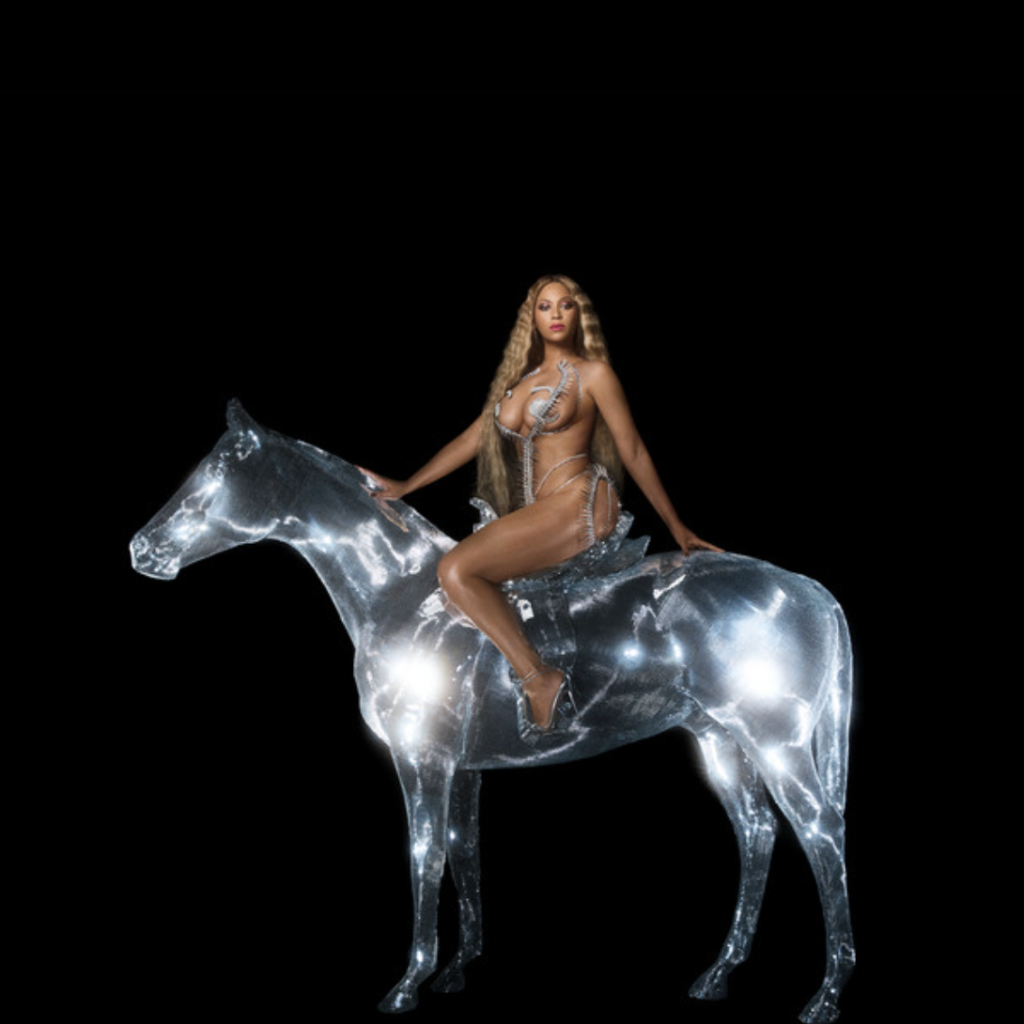
It’s tempting to call “Lemonade” Beyonce’s magnum opus given its clear vision and strength in sound, especially compared to what was generally a standard pop music output before. But, setting the standard and breaking it is something we should apparently get used to from Beyonce, and perhaps putting an artistic work that centers her husband’s infidelity on a pedestal is flawed, given her near demi-god status that’s permitted her to steer the direction of popular culture for the past two decades.
It takes that kind of image to usher in a new area, one the world was thirsty for given its energy was completely sapped by the pandemic. Beyonce and her army of writers and creatives were given ample time and space to stage their return. So what was the approach? What outfit would pop’s greatest performer be fashioned into after all had transpired since Lemonade’s release in 2016?
To some controversy, Renaissance entered the scene dripping in disco, house, ballroom and… oh what is that? Gay culture. Lead single “Break My Soul” is just so yaasss queen, and while Beyonce has always been a pillar of the gay community, the obvious call and response, “Why didn’t this come sooner?” and “Because it wasn’t marketable then” are top of mind. Is it a dedication to the fans, or commodifying what is now profitable? Either way, Beyonce is a business, and the cash flow needs to be wide enough to accommodate both the ego and mortgage payment of their recently acquired $200 million dollar Californian mansion.
And when Queen-B dropped a vogue track and immediately flew to Dubai – a country where same-sex relationships are punishable by death – to deliver a $24 million performance to a luxury hotel, it stung. The move also creatively flew in the face of Lemonade’s confessional realness. Was that intermarital spat, song and dance all for the check too?
But like with most artists of the day, you have to start separating them from their work, even when honesty is such a dichotomically needed ingredient. For Beyonce, the performance and execution eclipses any need for integrity, Renaissance is just so damn good regardless of which writer or think-tank produced it.
“ALIEN SUPERSTAR” has 24 writers alone, but propping up an artistic reputation this massive takes a party of producers, writers, samples, tributes and allusions. Surprise surprise – a system of creative genius so layered produces bangers, this track being a stratospheric introduction to an album that declares freedom through movement. Much of the aforementioned moral questions slip away once you experience the seamless transition between “PLASTIC OFF THE SOFA” and “VIRGO’S GROOVE”. It’s deadly smooth, like Grace Jone’s voice riding shotgun on “MOVE” or the ballroom vocal looping on the intro to “PURE/HONEY,” the composition giving way to Beyonce’s voice, “It should cost a billion to look this good.”
And for Beyonce, it literally does cost billions, but halfway through the beat switches and blossoms into a celebration where serving such elite energy suddenly feels possible for us earthly peasants too.
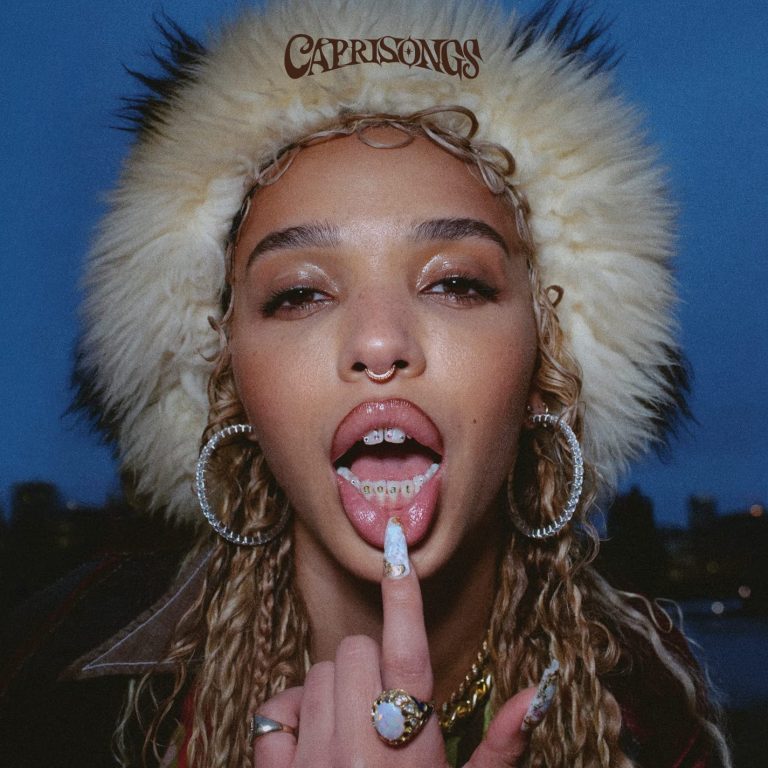
Where Beyonce found success in a methodically crafted piece de resistance, a magnum opus or high resolution mona lisa, whatever you’ll have, FKA Twigs found gold in the opposite direction. She’d been there and done that with serious art-pop, chasing angels and cherubs, alien beats syncopating on mud and earthly tones building worlds that are seeping with metaphor and depth in analytic possibilities. Her previous effort MAGDALENE embodied the artistry she’s capable of – not a peak, but a statement. Now, Twigs centers playful instinct, picking out jewels and sounds from her ever expanding repetoir.
“CAPRISONGS” is a fantastical exploration of taking it easy and as it comes, an effortless mixtape born album with space to breathe and reflect on past, future, and presence. The poetry here is not dense or highly intentional, it is synonymous to the accidental realizations had while shooting the shit on a living room carpet sprinkled with drinks and friends. Throughout the album we are introduced to Twigs circle through voice note samples, like scribblings on a CD sleeve teasing out what the album contains. The tracklist shapeshifts from R&B to pop to Afrobeats with squeaky vocals and cheerleader chants at times needed most. Whatever twigs was feeling in the moment is what we got.
Twigs seemed to tip off that she’d be entering her “main pop girl era,” with commercially formulated first single “Tears In The Club” featuring The Weeknd and some metallic piano samples from Arca. The combination is addicting, but the single stands in stark contrast to the alma mater of the rest of the album – strictly instinctual. Riding these instincts feels effortless, like on “honda,” the beat seductively speeding forward, but also a challenge, like on “meta angel,” wherein Twigs muses, “Each year I’m like, I’m gonna own my shit, and then each year I’m still so shy and so quiet.” A friend on the carpet attempts to gas her up or cozy himself up to fame, “The universe is so powerful, fam, you’re gonna be more free.”
Fame was the firestarter for Twigs previous work, MAGDALENE, which centered her experience as a woman scorned by the public amidst scandal. Now she is her own entity, “My work was so beautiful, it was so much louder than my love life. It is so much louder.” As “meta angel” reaches its end, Twig’s voice flies skyward as the beat acts as a deep counterweight, relinquishing desire itself to a higher power with the capacity to hold all she carries.
CAPRISONGS actualizes a comforting space most artists dream of occupying. Twigs has nothing to prove and much to say, effortlessly wielding whatever tool it is – her voice, her arrangements, her actual sword to swing, or pole to undulate on. But most captivating is her pen, the writing on “thank you song” closing 2022’s greatest album in beautiful simplicity. “Thank you, thank you, I’m okay, ‘Cause you care I made it through today.”
In the video, Twigs rides a public bus, mentally reciprocating love while dozing off, mirroring cute and hot people who also ride public transportation home after a long outing. Their day bag is full of little delights like chapstick and chocolates, their headphones rejoice in all the styles they emit, and the morning sun navigates between trees and city to bliss their skin. This album compliments living your best life like no other.
